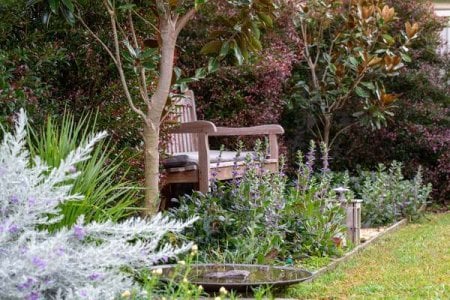Green giants or garden goblins? Horticulturalists unveil the trouble-makers lurking in your backyard
- Replies 0
Gardening is a beloved pastime for many Australians, especially those who have more time to dedicate to nurturing their backyards into lush retreats.
However, what starts as a tranquil hobby can quickly turn into a horticultural headache when certain plants begin to overstep their bounds.
It's not just about the aesthetics; some plants can cause real damage to your garden, home, and even your willpower as you battle to keep them in check.
Horticulturalists AB Bishop and Tammy Huynh shed light on the issue, highlighting that the line between a plant being a friendly addition or a rogue invader is often context-dependent.
Ms Huynh, also known as a presenter on Gardening Australia, advised that it's important to "be careful of what [we] do put in the ground."

Common culprits in the garden
According to Ms Bishop, Horticultural Editor for the Gardening Australia Magazine, plant varieties with extensive running roots or excessive suckering tendencies are ‘often destructive forces in your garden’.
For instance, the Robinia Mop Top ‘is renowned for suckering’, sprouting new plants from its roots and potentially taking over your space.
Yuccas, too, can multiply rapidly, and their towering growth often catches gardeners by surprise.
‘I'm convinced that people don't realise how tall they're going to grow,’ Ms Bishop said.
Then there are the plants that drop things—fronds, seeds, bark—which can create a maintenance nightmare as per Ms Bishop.
Palms and gum trees are prime examples, and white cedar trees are known for their ‘little fruits that, when they fall, can be very, very slippery’.
Indoor plants gone wild
The transition from indoor to outdoor can be a perilous one for certain plants, ‘like Monstera and the rubber plant—or rubber tree’, according to Ms Hyunh.
‘Just a warning that if people were thinking, “It's getting too big for my home, let me throw it outside”—unless you keep it in a contained environment, those plants grow like monsters,’ Ms Hyunh warned.
She also said that Monsteras are ‘actually quite adaptable’ and reminded everyone to ‘don't underestimate that’.
Ms Hyunh also mentioned that rubber plants have the capacity to develop into ‘a large tree’, posing the risk of ‘ruining paving, fencing, or infrastructure’.
Tradescantia, or spiderwort, is another indoor favourite that can become a garden menace.
‘Its stems break off quite easily, which then in nature, allows it to root quite easily,’ My Hyunh pointed out.
‘It can then take over your garden bed and then when you do go and try and pull them out, they break off so easily.’
‘Then the vicious cycle continues,’ she added.
Managing and maintaining your greenery
‘Always check the weed lists of your local councils, because what is going to be weedy in one area, isn't going to be weedy in another,’ Ms Bishop suggested.
She noted that foxglove species—primarily plants that grow in clumps and produce multiple flowers on a tall stem—have extended their presence into the Tasmanian wilderness.
She cautioned against any plants that might stray from your garden and ‘create havoc’.
According to Ms Huynh, Agapanthus are also known for their challenging tendency to spread aggressively.
‘The older varieties seed very easily, and birds also pick up the seeds and then distribute them,’ she explained.
‘Bamboo gets [a] really bad rap, but choosing the right species will ensure… you don't end up lifting your neighbours' pavers.’
Ms Hyunh added that managing certain types of ‘running bamboo’—those that proliferate rapidly—may require some effort, but ‘you can manage bamboo by cutting back new shoots of bamboo and painting them with weed killer’.
She also noted that depending on your financial resources, you may also opt to erect a physical barrier to confine running bamboo varieties.
‘Digging down like 600 millimetres into the ground and putting either concrete or some sort of barrier so that the bamboo can't run,’ she continued.
Indoor plant considerations
Ms Huynh cautioned renters and homeowners alike, that it's important to be aware that plants can cause damage indoors as well.
She explained that many commonly favoured indoor plants belong to the 'aroid category', which encompasses plants like devil's ivy, for example.
‘They all have developed aerial roots, because in nature they like to climb up trees as they're searching for sunlight,’ she explained.
This poses a risk, particularly to painted surfaces, when plants are removed from skirting boards and walls.
Ms Huynh suggested relocating these types of plants away from surfaces they might harm, or providing them with something to ‘cling to’.
Choosing problem-free plants
Ms Bishop mentioned that municipal weed catalogues typically feature substitutes for potentially troublesome species.
‘Always consider native alternatives, especially indigenous ones—they're ones which have evolved in your area,’ she said.
‘They'll also attract more native wildlife to your garden.’
If you find yourself in possession of a property harbouring unwanted clusters of troublesome plants, her recommendation is to ‘bite the bullet and get rid of them and start afresh’.
She also suggests considering the neighbours when selecting plants.
Ms Huynh noted that there are excellent online resources available for identifying suitable plants for your garden; however, consulting your local nursery is another valuable option.
‘Most of them have trained horticulturists who will be able to advise,’ she said.
‘The more information you're able to give them, the better they're able to advise you.’
As you navigate the potential hazards posed by certain plants in your garden, it's crucial to also consider the care and maintenance required to keep your greenery thriving.
Overwatering, in particular, can pose a significant risk to your plants' health and longevity.
But fear not, as a pro gardener shared a genius trick to help you determine exactly when your plants are thirsty, ensuring they receive just the right amount of hydration.
 Do you have any of these potentially problematic plants in your garden? What are your tips for avoiding the problems they cause? We'd love to hear your experiences and insights in the comments below!
Do you have any of these potentially problematic plants in your garden? What are your tips for avoiding the problems they cause? We'd love to hear your experiences and insights in the comments below!
However, what starts as a tranquil hobby can quickly turn into a horticultural headache when certain plants begin to overstep their bounds.
It's not just about the aesthetics; some plants can cause real damage to your garden, home, and even your willpower as you battle to keep them in check.
Horticulturalists AB Bishop and Tammy Huynh shed light on the issue, highlighting that the line between a plant being a friendly addition or a rogue invader is often context-dependent.
Ms Huynh, also known as a presenter on Gardening Australia, advised that it's important to "be careful of what [we] do put in the ground."

Horticulturalists AB Bishop and Tammy Huynh discussed plants that could damage your garden. Credits: Shutterstock
Common culprits in the garden
According to Ms Bishop, Horticultural Editor for the Gardening Australia Magazine, plant varieties with extensive running roots or excessive suckering tendencies are ‘often destructive forces in your garden’.
For instance, the Robinia Mop Top ‘is renowned for suckering’, sprouting new plants from its roots and potentially taking over your space.
Yuccas, too, can multiply rapidly, and their towering growth often catches gardeners by surprise.
‘I'm convinced that people don't realise how tall they're going to grow,’ Ms Bishop said.
Then there are the plants that drop things—fronds, seeds, bark—which can create a maintenance nightmare as per Ms Bishop.
Palms and gum trees are prime examples, and white cedar trees are known for their ‘little fruits that, when they fall, can be very, very slippery’.
Indoor plants gone wild
The transition from indoor to outdoor can be a perilous one for certain plants, ‘like Monstera and the rubber plant—or rubber tree’, according to Ms Hyunh.
‘Just a warning that if people were thinking, “It's getting too big for my home, let me throw it outside”—unless you keep it in a contained environment, those plants grow like monsters,’ Ms Hyunh warned.
She also said that Monsteras are ‘actually quite adaptable’ and reminded everyone to ‘don't underestimate that’.
Ms Hyunh also mentioned that rubber plants have the capacity to develop into ‘a large tree’, posing the risk of ‘ruining paving, fencing, or infrastructure’.
Tradescantia, or spiderwort, is another indoor favourite that can become a garden menace.
‘Its stems break off quite easily, which then in nature, allows it to root quite easily,’ My Hyunh pointed out.
‘It can then take over your garden bed and then when you do go and try and pull them out, they break off so easily.’
‘Then the vicious cycle continues,’ she added.
Managing and maintaining your greenery
‘Always check the weed lists of your local councils, because what is going to be weedy in one area, isn't going to be weedy in another,’ Ms Bishop suggested.
She noted that foxglove species—primarily plants that grow in clumps and produce multiple flowers on a tall stem—have extended their presence into the Tasmanian wilderness.
She cautioned against any plants that might stray from your garden and ‘create havoc’.
According to Ms Huynh, Agapanthus are also known for their challenging tendency to spread aggressively.
‘The older varieties seed very easily, and birds also pick up the seeds and then distribute them,’ she explained.
‘Bamboo gets [a] really bad rap, but choosing the right species will ensure… you don't end up lifting your neighbours' pavers.’
Ms Hyunh added that managing certain types of ‘running bamboo’—those that proliferate rapidly—may require some effort, but ‘you can manage bamboo by cutting back new shoots of bamboo and painting them with weed killer’.
She also noted that depending on your financial resources, you may also opt to erect a physical barrier to confine running bamboo varieties.
‘Digging down like 600 millimetres into the ground and putting either concrete or some sort of barrier so that the bamboo can't run,’ she continued.
Indoor plant considerations
Ms Huynh cautioned renters and homeowners alike, that it's important to be aware that plants can cause damage indoors as well.
She explained that many commonly favoured indoor plants belong to the 'aroid category', which encompasses plants like devil's ivy, for example.
‘They all have developed aerial roots, because in nature they like to climb up trees as they're searching for sunlight,’ she explained.
This poses a risk, particularly to painted surfaces, when plants are removed from skirting boards and walls.
Ms Huynh suggested relocating these types of plants away from surfaces they might harm, or providing them with something to ‘cling to’.
Choosing problem-free plants
Ms Bishop mentioned that municipal weed catalogues typically feature substitutes for potentially troublesome species.
‘Always consider native alternatives, especially indigenous ones—they're ones which have evolved in your area,’ she said.
‘They'll also attract more native wildlife to your garden.’
If you find yourself in possession of a property harbouring unwanted clusters of troublesome plants, her recommendation is to ‘bite the bullet and get rid of them and start afresh’.
She also suggests considering the neighbours when selecting plants.
Ms Huynh noted that there are excellent online resources available for identifying suitable plants for your garden; however, consulting your local nursery is another valuable option.
‘Most of them have trained horticulturists who will be able to advise,’ she said.
‘The more information you're able to give them, the better they're able to advise you.’
As you navigate the potential hazards posed by certain plants in your garden, it's crucial to also consider the care and maintenance required to keep your greenery thriving.
Overwatering, in particular, can pose a significant risk to your plants' health and longevity.
But fear not, as a pro gardener shared a genius trick to help you determine exactly when your plants are thirsty, ensuring they receive just the right amount of hydration.
Key Takeaways
- Running-root and sucker-prone plants like Robinia Mop Top and yuccas can overtake spaces and cause destructive forces in gardens.
- Horticulturalists AB Bishop and Tammy Huynh advised caution when planting indoor plants like monsteras and rubber trees, which can grow excessively large and damage surrounding infrastructure when planted outside.
- Plant management and maintenance are essential to prevent certain species from becoming invasive or creating havoc in both garden and natural environments.
- It's important to consult council weed lists for non-problematic alternatives, and local nursery horticulturists can offer tailored advice for choosing the right plants for your garden.








